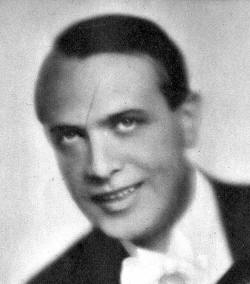

Queer Places:
Skogsö Kapell och Kyrkogård
Saltsjobaden, Nacka kommun, Stockholms län, Sweden
 Karl
Gerhard (April 14, 1891 - April 22, 1964) was a Swedish actor, cabaret
entertainer and songwriter. Gerhard started out as a dramatic actor, but from
the 1920s onwards he rose to fame by introducing a new form of revue in which
he satirised contemporary trends, politicians and society figures. Gerhard
both wrote and starred in all his revues, producing over 60 of them and
writing more than 4,000 songs. Elegant and urbane in style and attitudes, he
has been described as a cross between Aristophanes,
Maurice Chevalier and
Noel Coward. During the 1930s he became a
staunch opponent of Nazism and fascism, and in 1941 one of his revues was
censored after an intervention from the German embassy. Gerhard, who was
married three times, spent the latter part of his life living with another man
and an adopted daughter. An inspired female impersonator, Gerhard also dealt
with the themes of homosexuality and sexual inversion in some of his songs,
and did so very openly despite homosexuality being illegal at the time.
Notable examples are his signature number ‘Jazzgossen’ (‘The Jazz Boy’) from
1922 in which he satirises the effeminate homosexual dandies of the 1920s, and
‘La Garçonne’ and ‘Flickan i frack’ (‘The Girl in Tails’), which deal with
masculine ideals among women.
Karl
Gerhard (April 14, 1891 - April 22, 1964) was a Swedish actor, cabaret
entertainer and songwriter. Gerhard started out as a dramatic actor, but from
the 1920s onwards he rose to fame by introducing a new form of revue in which
he satirised contemporary trends, politicians and society figures. Gerhard
both wrote and starred in all his revues, producing over 60 of them and
writing more than 4,000 songs. Elegant and urbane in style and attitudes, he
has been described as a cross between Aristophanes,
Maurice Chevalier and
Noel Coward. During the 1930s he became a
staunch opponent of Nazism and fascism, and in 1941 one of his revues was
censored after an intervention from the German embassy. Gerhard, who was
married three times, spent the latter part of his life living with another man
and an adopted daughter. An inspired female impersonator, Gerhard also dealt
with the themes of homosexuality and sexual inversion in some of his songs,
and did so very openly despite homosexuality being illegal at the time.
Notable examples are his signature number ‘Jazzgossen’ (‘The Jazz Boy’) from
1922 in which he satirises the effeminate homosexual dandies of the 1920s, and
‘La Garçonne’ and ‘Flickan i frack’ (‘The Girl in Tails’), which deal with
masculine ideals among women.
My published books: